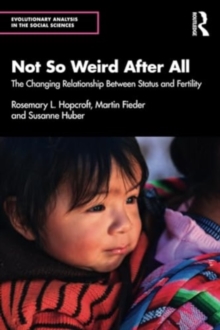Description
| Product ID: | 9781032732886 |
| Product Form: | Paperback / softback |
| Country of Manufacture: | GB |
| Series: | Evolutionary Analysis in the Social Sciences |
| Title: | Not So Weird After All |
| Subtitle: | The Changing Relationship Between Status and Fertility |
| Authors: | Author: Martin Fieder, Susanne Huber, Rosemary L. Hopcroft |
| Page Count: | 116 |
| Subjects: | Social classes, Social classes, Gender studies, gender groups, Population and demography, Social and cultural anthropology, Gender studies, gender groups, Population & demography, Social & cultural anthropology, ethnography |
| Description: | Select Guide Rating This is the first book to fully examine, from an evolutionary point of view, the association of social status and fertility in human societies before, during, and after the demographic transition. This is the first book to fully examine, from an evolutionary point of view, the association of social status and fertility in human societies before, during, and after the demographic transition. In most nonhuman social species, social status or relative rank in a social group is positively associated with the number of offspring, with high-status individuals typically having more offspring than low-status individuals. However, humans appear to be different. As societies have gotten richer, fertility has dipped to unprecedented lows, with some developed societies now at or below replacement fertility. Within rich societies, women in higher-income families often have fewer children than women in lower-income families. Evolutionary theory suggests that the relationship between social status and fertility is likely to be somewhat different for men and women, so it is important to examine this relationship for men and women separately. When this is done, the positive association between individual social status and fertility is often clear in less-developed, pre-transitional societies, particularly for men. Once the demographic transition begins, it is elite families, particularly the women of elite families, who lead the way in fertility decline. Post-transition, the evidence from a variety of developed societies in Europe, North America and East Asia is that high-status men (particularly men with high personal income) do have more children on average than lower-status men. The reverse is often true of women, although there is evidence that this is changing in Nordic countries. The implications of these observations for evolutionary theory are also discussed. This book will be of interest to students and researchers in the social sciences with an interest in evolutionary sociology, evolutionary anthropology, evolutionary psychology, demography, and fertility. |
| Imprint Name: | Routledge |
| Publisher Name: | Taylor & Francis Ltd |
| Country of Publication: | GB |
| Publishing Date: | 2024-03-26 |


